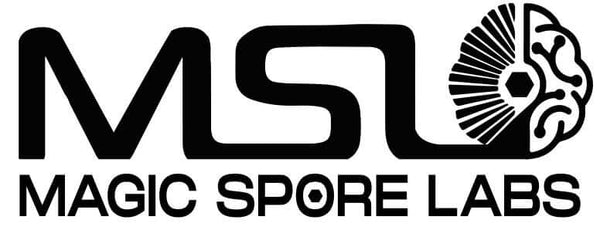
What Are Magic Mushroom Spores and What Are They For?
Share
Magic mushrooms, also known as psilocybin mushrooms, have gained significant attention in recent years for their potential therapeutic and recreational benefits. While the mushrooms themselves are often the focus of discussion, there's another crucial element in the life cycle of these fascinating fungi - spores. In this article, we'll delve into the world of magic mushroom spores, exploring what they are, their role in the mushroom life cycle, and their significance to both mycology enthusiasts and researchers.
What Are Magic Mushroom Spores?
Magic mushroom spores are the reproductive cells of psilocybin-containing mushrooms. They are microscopic in size and serve the same purpose as seeds in plants. Spores are essential for the survival and propagation of magic mushrooms. Each spore contains the genetic information required to grow into a mature mushroom.

These spores come in a variety of colors, including white, black, brown, and purple. The color of the spores is often used to help identify different species of magic mushrooms. Some of the most well-known magic mushroom species include Psilocybe cubensis, Psilocybe semilanceata (also known as liberty caps), and Psilocybe cyanescens.
The Role of Spores in the Mushroom Life Cycle
Understanding the role of spores in the mushroom life cycle is crucial to comprehending their significance. Magic mushrooms, like all fungi, have a unique and complex life cycle that includes several stages.
Spore Release: Magic mushrooms begin their life cycle as spores. These spores are released from mature mushrooms into the environment when they are ready. They are carried by the wind or various other means, spreading far and wide.
Germination: Once a spore lands in a suitable environment, it can germinate. Germination is the process in which the spore starts to grow and develop into a mycelium.
Mycelium Formation: The mycelium is a network of thread-like structures that grow underground or within a substrate. It serves as the vegetative part of the fungus and plays a crucial role in nutrient absorption.
Fruiting Body Development: Under the right conditions, the mycelium will develop a fruiting body, which we recognize as the mushroom. This fruiting body contains the psychoactive compounds psilocybin and psilocin, which are responsible for the hallucinogenic effects.
Spore Formation: The mature mushroom produces spores in its gills, which are then released to complete the life cycle.
This cyclical process ensures the survival of the magic mushroom species. The spores, in particular, are integral for propagating new generations of mushrooms.
How Spores Are Used in Mycology
Spores have a significant role in mycology, the study of fungi. Mycologists and enthusiasts use spores for various purposes, including research and taxonomy. Here are some of the ways in which spores are utilized:
Taxonomy: Spores are a crucial tool for identifying and classifying different mushroom species. The color, shape, and size of spores, as well as their microscopic characteristics, provide valuable information for distinguishing one species from another.
Research: Researchers often rely on spores to study the genetics and biology of magic mushrooms. They can use spores to conduct experiments and explore the potential therapeutic properties of these fungi.
Species Preservation: Mycologists work to preserve different mushroom species, including rare and endangered ones. Collecting and storing spores from these species is essential for their conservation.
The Legal Status of Magic Mushroom Spores

The legal status of magic mushroom spores varies from country to country and even within different regions. In many places, the spores themselves are legal to possess and purchase, as they do not contain the psychoactive compounds found in the mature mushrooms. However, it's essential to check local and national laws regarding the possession and distribution of spores.
In some regions, the cultivation of magic mushrooms from spores may be considered illegal, as it can lead to the production of the controlled substances psilocybin and psilocin. Therefore, it is crucial for individuals interested in magic mushroom spores to research and understand the legal implications in their specific area.
The Importance of Responsible Spore Use
As with any substance or organism with the potential for recreational or therapeutic use, it's vital to emphasize responsible and ethical practices when it comes to magic mushroom spores. Here are some key points to consider:
Compliance with Local Laws: Always ensure that you are abiding by the laws and regulations in your area when it comes to the possession and use of magic mushroom spores.
Safety and Harm Reduction: For those using magic mushrooms for their psychoactive effects, it's important to prioritize safety and practice harm reduction. This includes using the mushrooms in a safe and controlled environment, with a trusted friend or guide if necessary.
Respect for Nature: When collecting spores from the wild, be mindful of the ecosystems and habitats you encounter. Avoid damaging the environment and practice sustainable foraging.
Conclusion
Magic mushroom spores play a pivotal role in the life cycle of psilocybin-containing mushrooms. They are the starting point for the growth of these fascinating fungi and are vital for their survival and propagation. Spores also have significant applications in mycology, aiding researchers and enthusiasts in the study, identification, and cultivation of various mushroom species.
It is crucial to be aware of the legal status of magic mushroom spores in your area and to use them responsibly and ethically, whether for research. By respecting the laws and the environment, we can enjoy the benefits of magic mushroom spores while also contributing to the preservation of these remarkable fungi and their ecosystems.
